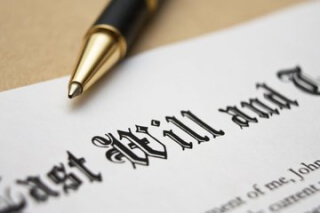What Grade Does Your Estate Plan Get?

Many people think that having an estate plan just means drafting a will or a trust. Not true! There’s much more to add to your estate planning to be sure that all of your assets are transferred efficiently to your heirs, when you pass away.
Investopedia’s recent article, “6 Estate Planning Must-Haves,” provides a list of items that every estate plan should have. This includes a will (and perhaps a trust), a durable power of attorney, up-to-date beneficiary designations, a letter of intent, a healthcare power of attorney and guardianship designations.
Let’s take a look at each item on the list to see if you’ve left any decisions to chance.
Wills and Trusts. This should be one of the main elements of every estate plan—even if you don’t have substantial assets. Wills are documents that make certain property is distributed, according to your wishes (if drafted pursuant to state laws). Some trusts also help limit estate taxes or legal issues. But this isn’t enough. The wording of these documents is extremely critical: a will or trust should be written in a way that’s consistent with the way you’ve bequeathed the assets that pass outside of the will.
Durable Power Of Attorney. A durable POA authorizes an agent of your own choosing to act on your behalf, when you’re unable to do so for yourself. Without a power of attorney, a judge may have to decide what happens to your assets, if you’re found to be mentally incompetent. That ruling may not be what you wanted. A POA can give your agent the power to transact real estate, enter into financial transactions and make other legal decisions in your stead (as if he or she were you). This POA is revocable by the principal at a time of his or her choosing, typically at a time when the principal is deemed to be physically able, mentally competent or upon death.
Beneficiary Designations. Some assets can pass directly to your heirs, without being dictated in the will (like a 401(k) plan). Therefore, it’s important to have an up-to-date beneficiary, as well as a contingent beneficiary, on these types of accounts. If you fail to designate a beneficiary, or if the beneficiary has passed away or is unable to serve, a judge may decide what to do with your funds. This again may not be what you wanted.
Letter of Intent. This is a document, left to your executor or a beneficiary, that defines what you want done with a particular asset, after your death or incapacitation. It can also provide funeral details or other special requests. It’s not a legal document, but it helps inform a probate judge of your intentions and may help in the distribution of your assets, if the will is deemed invalid.
Healthcare Power of Attorney. This appoints another individual (usually a spouse or family member) to make important healthcare decisions on your behalf, in the event of incapacity. If you’re thinking about creating such a document, you should select someone you trust, who shares your views and who would likely recommend a course of action with which you’d agree. A backup agent should also be named, if your initial pick is unavailable or unable to act at the time needed.
Guardianship Designations. If you have minor children or are considering having kids, choosing a guardian is very important and many times is overlooked. Be sure the individual or couple you choose shares your views, is financially sound and is willing to rear your children. You should also add a contingent guardian. Without these designations, a judge could rule that your kids should live with a family member you wouldn’t have wanted, and in some cases, the court could require that your children become wards of the state.
As you can see, a will is a great start, but it’s just the beginning.
Reference: Investopedia (April 18, 2018) “6 Estate Planning Must-Haves”

